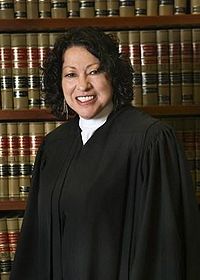Sotomayor – Determiner of Truth
I am bit behind the news cycles with this post, but I did not want to miss the chance to comment on the role communities play in determining truth.
On August 6th, the US Senate confirmed Sonia Sotomayor as the 111th Supreme Court Justice in the United States. By all accounts her confirmation was relatively smooth sailing despite the partisan bickering found mostly on the fringes of the discussion. With her 68-31 confirmation vote she became just the third woman and the first hispanic to sit on our nation’s highest court. This selection process revealed a lot about our nation, but it also provided a lens through which we can view and understand the nature of “truth.”
While the confirmation hearings were generally calm, many lambasted her as being an “activist judge” and several organizations openly opposed her selection. The most most notable was the NRA, who submitted an official letter calling her views on the 2nd amendment into question.
If you read the letter and followed the arguments against her, you will find the people who stood against her did so largely because the disagreed with the way she understood the law. The reason they were so adamant in their opposition is because they realized at the end of the day, it does not matter what any individual thinks a law means, but rather, what the majority of the supreme court thinks it means. The NRA and other conservative groups want like minded thinkers to be on the court because they realize the what the second amendment (and all laws) truly means is not static, but rather is interpreted. Literally, the law means whatever the court says it means. You can disagree, but you will be wrong.
It is interesting when you think about how the leanings of the courts affect this. At certain times in our nation’s history, the truth of the law was more conservative. At other times, it was more liberal. But what was constant is that legal truth was determined by the supreme court and the community of people who formed it.
Morality functions in the same way. The only difference is the communities who determine it are much larger. Think of misogynistic practices and slavery. At one time these practices were considered acceptable and moral — but obviously this is not longer the case. Did the morality of the acts change? No. Rather, the communities who determine morality changed (over time).
I have learned from many conversations that many people are not comfortable with this discussion — especially Christians who believe in the absolute truth of scripture. The problem is that the meaning and “truth” of scripture have changed more often than our Constitution. If you don’t believe me just read a survey of how various commentators have understood The Good Samaritan in the Gospel of Luke.
Truth is not individually relative. That is to say, we all can’t go around making up what things mean. But at the same time, it is dynamic. Truth is determined by the communities who are willing to earnestly seek it. It is my hope that each of us will take the question of truth seriously, just as we expect Sotomayor to seriously question what the truth of the law is in every case she is presented.
